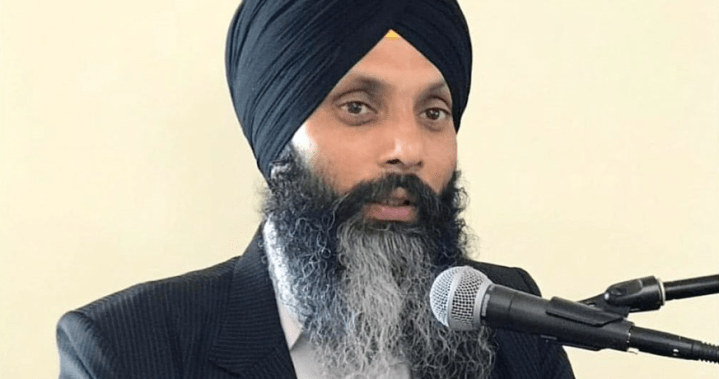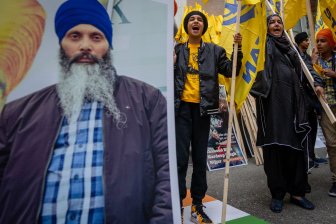The Indian government has rejected what it calls “absurd” allegations that it was behind the murder of Hardeep Singh Nijjar, a B.C. Sikh leader, and is expelling a Canadian diplomat in return.
Prime Minister Justin Trudeau made the bombshell allegation in the House of Commons on Monday, saying Canadian intelligence agencies had “credible” evidence agents of Prime Minister Narendra Modi’s government played a role in the June slaying of 45-year-old Nijjar.
“Over the past number of weeks, Canadian security agencies have been actively pursuing credible allegations of a potential link between agents of the government of India and the killing of a Canadian citizen,” Trudeau said.
“Any involvement of a foreign government in the killing of a Canadian citizen on Canadian soil is an unacceptable violation of our sovereignty. It is contrary to the fundamental rules by which free, open and democratic societies conduct themselves.”

The Indian government Tuesday rejected allegations of involvement in Nijjar’s death, calling them “absurd and motivated.”
“Such unsubstantiated allegations seek to shift the focus from Khalistani terrorists and extremists, who have been provided shelter in Canada and continue to threaten India’s sovereignty and territorial integrity,” India’s Ministry of External Affairs said in a statement.
Furthermore, India’s Ministry of External Affairs said an unnamed senior Canadian diplomat has been asked to leave India within the next five days.
“The decision reflects Government of India’s growing concern at the interference of Canadian diplomats in our internal matters,” it said.
Nijjar was killed in the parking lot of his gurdwara in Surrey, B.C. on June 18.
While Sikh community leaders in Canada have insisted the Indian government was involved, police previously said they had not made any link to foreign interference.
Both Foreign Affairs Minister Melanie Joly and Public Safety Minister Dominic LeBlanc raised foreign interference as a concern in a press conference discussing the allegations on Monday.
“This would be a grave violation of our sovereignty and of the most basic rule of how countries deal with each other. We’ve been clear — we will not tolerate any form of foreign interference,” Joly said.
“Justice Hogue’s terms of reference allow her to follow the evidence,” added LeBlanc, referencing the commissioner now leading a foreign interference inquiry.
“We assume that she and the security agencies will do what’s necessary for her inquiry to also look at the ways that India interferes in Canada.”

The move comes after Joly said earlier on Monday that Canada was expelling India’s Pavan Kumar Rai, whom her department lists in its public registry as a diplomatic agent who heads up an Indian intelligence agency based in Ottawa.
India had issued an arrest warrant against Nijjar for his advocacy for a separate Sikh state in India’s Punjab region, which activists call Khalistan.

His June death sent shockwaves through Metro Vancouver and Canada’s Sikh community, with thousands attending his funeral later that week. Community members vowed Monday to protest Indian consulate offices across the country in reaction to Trudeau’s disclosure.
NDP Leader Jagmeet Singh, who is himself Sikh, called the allegations outrageous and shocking. Singh said he grew up hearing stories that challenging India’s record on human rights might prevent you from getting a visa to travel there.
Conservative Leader Pierre Poilievre told the House Monday that if the allegations are proven true, they represent an “outrageous affront” to Canadian sovereignty. He said India needs to “act with utmost transparency” in the investigation.
Nijjar a Khalistani advocate
Nijjar was not only a community leader and advocate, but a Khalistani. The Khalistan movements rose to prominence in the 1980s, however discussion around sovereignty for Sikhs and Punjab can be traced back to the 1947 partition of India.
India has fought against a movement to establish an independent Sikh since the 1980s, when a raid on separatists in a major temple led to the assassination of a prime minister and a wave of anti-Sikh violence.
India has long demanded that Canada take action against the Sikh independence movement, which is banned in India but has support in countries like Canada and the U.K. with sizable Sikh diaspora populations.

Canada has a Sikh population of more than 770,000, about two per cent of its total population.
In March, the Modi government summoned the Canadian high commissioner in New Delhi, the top diplomat in the country, to complain about Sikh independence protests in Canada.
In 2020, India’s foreign ministry also summoned the top diplomat over comments made by Trudeau about an agricultural protest movement associated with the state of Punjab, where many Sikhs live.
Critics accuse Modi’s Hindu nationalist government of seeking to suppress dissenters and activists using sedition laws and other legal weapons.

Some critics of his administration, including intellectuals, activists, filmmakers, students and journalists have been arrested, creating what Modi’s opponents say is a culture of intimidation.
The allegation adds to tense relations between Canada and India. Trade talks have derailed, and Canada just cancelled a trade mission to India that was planned for the fall.
Canada’s allies are weighing in on the development as well.
“We are deeply concerned about the allegations referenced by Prime Minister Trudeau,” said White House National Security Council spokesperson Adrienne Watson.
“We remain in regular contact with our Canadian partners. It is critical that Canada’s investigation proceed and the perpetrators be brought to justice.”
A spokesperson for Australian Foreign Minister Penny Wong said the nation is “closely engaged with partners on developments.”
“We have conveyed our concerns at senior levels to India,” they said.

Britain said Tuesday it was in close touch with its Canadian partners about the “serious allegations.”
“We are in close touch with our Canadian partners about these serious allegations,” a government spokesperson said.
“It would be inappropriate to comment further during the ongoing investigation by the Canadian authorities.”
— with files from The Canadian Press, The Associated Press and Reuters




